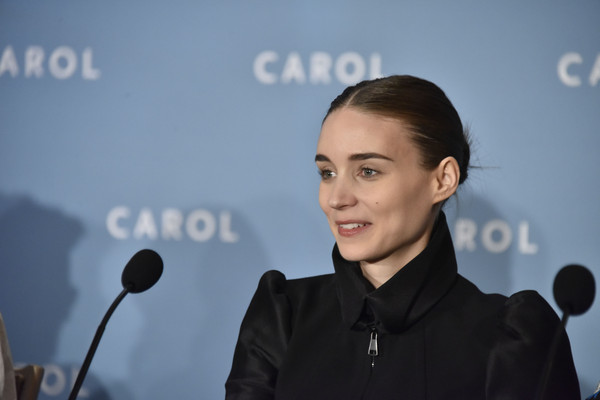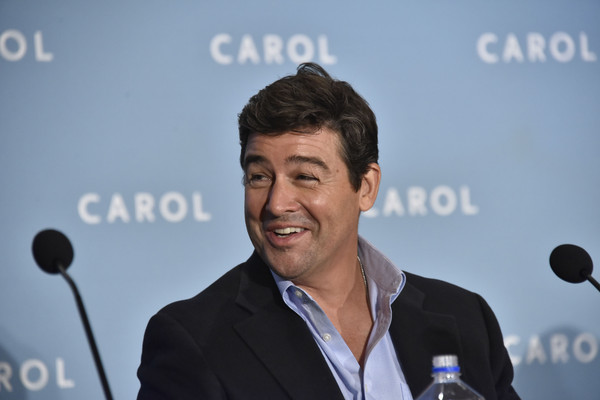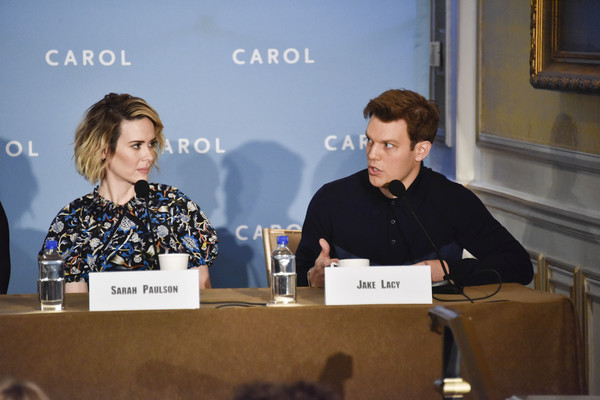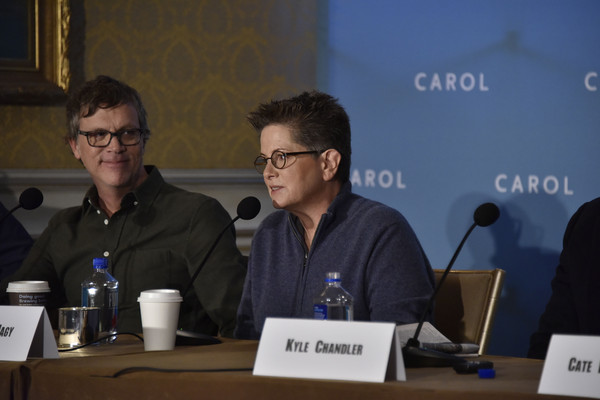The unexpected emergence of a controversial relationship that brings about both extreme benefits and consequences often powerfully captures and highlights the social climate of the society the people involved live in. The new romantic drama ‘Carol,’ which is set to open in select theaters on Friday, is an engaging adaptation of Patricia Highsmith’s seminal 1952 novel, ‘The Price of Salt.’ The story in director Todd Haynes’ latest acclaimed film and the award-winning author’s book captivatingly depicts such a contentious connection during the transitional period of the 1950s, following the end of World War II.
As America was marked by feelings of both paranoia and optimism, while the world’s politics was continuously changing, the need to find someone you truly love, and who feels the same about you, was more essential than ever during the time the story’ set. To discuss the significance of finding true love in a world driven by rivalry and greed, Haynes was joined by ‘Carol’s screenwriter, Phyllis Nagy, and actors Cate Blanchett, Rooney Mara, Sarah Paulson, Kyle Chandler and Jake Lacy, at the film’s recent press conference at the W Marriott Essex House Hotel in New York City.
‘Carol’ follows two women from very different backgrounds who find themselves in an unexpected love affair in 1950s New York. As conventional norms of the time challenge their undeniable attraction, their mutual resilience leads them both to try to make their romantic relationship work. An aspiring young photographer in her 20s, Therese Belivet (Rooney Mara), is currently working as a clerk in a Manhattan department store, but feels unfulfilled in her work and romantic relationship with Richard Semco (Jake Lacy). As she dreams of obtaining a more fulfilling life, she meets Carol Aird (Cate Blanchett), an alluring older woman who’s trapped in a convenient marriage to a man she no longer loves, Harge (Kyle Chandler).
While Therese helps Carol pick out a Christmas toy for her young daughter, Rindy (Sadie Heim), an immediate connection sparks between the two women. While Therese innocently accepts an invitation to have lunch with her customer after returning her lost gloves, their connection deepens as they begin to get to know each other. While Carol then begins breaks free from the confines of her marriage, her husband begins to question her competence as a mother to Rindy. As Carol’s involvement with Therese, and close relationship with her best friend, Abby (Sarah Paulson), with whom she also once had a romantic tryst with, come to light, she must find the best way to maintain her own happiness, while also being the best mother she can be to Rindy.
Haynes opened the press conference by discussing how he brought the emotional arcs presented in Nagy’s screenplay to the screen. “I was really taking it on by truly looking at the love story, which is something I feel like I haven’t fully accomplished directly in my other films,” the Oscar-nominated filmmaker revealed. “That began by reading ‘The Price of Salt’ and Phyllis’ gorgeous adaptation. The script came to me with Cate attached, so there were a lot of incentives when it first came to me in 2013.”
Love stories in movies are “about conquering the subject,” Haynes also said. “So it’s the (story’s) subject that’s always in a state of vulnerability and peril on some level.” The director also noted that the character of Therese “occupies a much less powerful place in the world” than the title character, and is also much more open. “What I love about the story is that it moves (Carol and Therese) through a series of events that change them both,” he then revealed.
While Therese is much less experienced than Carol throughout the romantic drama, Blanchett noted that her title character was never able to express her goals and dreams with anyone when she was the younger woman’s age. As a result, Carol would often ask her new love interest what she wished to accomplish with her life, like if she wanted to become a photographer.
But the two-time Academy Award-winning actress added that she thinks Carol “is a very private person, whose sexuality and relationship with herself isn’t unsettled or ambiguous. She lives in a quiet hell because she’s not able to express herself, in part because of the way she was brought up.”
While the marriage between Carol and Harge has been described as loveless, Blanchett added that she doesn’t think their relationship was void of true feelings of admiration. But the marriage appears to be loveless on the surface, because she meets Therese when “she has a tremendous amount to lose,” the actress explained. Carol and Harge “have found an unhappy balance, but I don’t know if you can truly find an unhappy balance with Kyle Chandler,” she added, as she fondly spoke of her co-star. But she also feels that Carol’s risking a lot by leaving Harge, because she’ll have to risk losing time with their daughter.
Mara then chimed in by describing how she showcased Therese’s evolution throughout ‘Carol.’ The Academy Award-nominated performer noted that she worked on the character’s change during the cast’s two weeks of rehearsal before they began filming. “We weren’t only mapping out Therese’s journey during rehearsal, but the entire script,” the actress also revealed.
Nagy, who knew Highsmith before she died in 1995, then described her experience of adapting ‘The Price of Salt’ into the film’s script. “One of the things I was intent on doing was not overlaying a modern psychology onto any of the characters,” the Emmy Award-nominated screenwriter revealed. She explained that she feels if you overlay a psychology of any kind onto characters, “you’re immediately judging them. It seemed important for all the nuances in the relationship between the central quartet that we didn’t do that.” The screenwriter emphasized that the love in the story “is all about instinct, and not about calculation.”
Chandler then noted that he humanized Harge as he showcased his instincts, which he did in part with the help of Haynes’ “good direction.” The Emmy Award-winning actor also praised Nagy “for leaving everything open for Harge to do as he will.” He added that “As I was playing him, I realized that he could easily become a stereotypical character.” But he tried not to give into those prejudices, as “the worst time in a man or woman’s life is when they realize they’re not in love anymore. But this character never realized that he wasn’t in love anymore-he was always intensely in love.”
The actor added that the daughter Harge shared with Carol, as well as their family unit, wasn’t only important to his social status, but his overall happiness. Harge “never lost his love (for Carol), so he was very confused about what was going on,” Chandler explained. The performer emphasized that he truly embraced starring in ‘Carol’ because of the material, particularly in how his character continued to love his estranged wife.
Paulson than began discussing Abby’s continued friendship and love towards Carol, a few years after the two had their romantic interlude together, while the title character was still emotionally committed to Harge. “I really tried to think about friendship, selflessness and unwavering loyalty, because I think Abby still has feelings for Carol,” the Emmy Award-nominated actress revealed.
“I wonder what I would do if I still had feelings for someone, and I was called in to rescue the person that she currently loves,” Paulson also pondered. The fact that Abby supported Carol’s growing attraction to Therese is “a testament to her friendship and love,” as well as her continued desire to be around her best friend, the performer added.
Another supporting character who feels increasingly left out of touch with Carol and Therese’s growing relationship is Richard. Lacy revealed that when he first met Haynes, they spoke a little about the fact that his character’s “young, handsome, in New York and has a job and a girl. The world is his for the taking, and yet it slips away from him.” The actor also described Richard’s relationship with Therese as a “dream that falls apart, as someone’s not willing to be a part of it.”
While Richard and Harge find it difficult to understand Carol and Therese’s growing attraction to, and connection with, each other, Mara stated that she doesn’t believe that the film has a political agenda. “It’s not preaching to the audience, so they can watch it for what it is-it’s a love story between two humans,” the Golden Globe Award-nominated actress emphasized.
Even though Carol considers her marriage to Harge to be over, as she is falling in love with Therese, Nagy does feel as though the title character is putting another one of her most important relationships at risk-the one with her young daughter. “In her heart, she’s not giving up her child. But she’s allowing her child to grow up in the environment that’s best for her. Carol’s being a good mother as she allows her daughter to be with Harge,” the writer noted.
Carol’s “also exerting an authority over the situation,” Haynes added to the discussion of Carol’s bond with her young daughter. “She’s basically giving a veiled threat by saying, ‘I want to see Rindy on my terms. If not, this may go to court and get ugly,'” the writer-director revealed.
“A mother makes her own choice based on her own survival,” Blanchett noted as she also offered her thoughts on the custody battle between her character and her estranged husband. If she doesn’t make that choice, “she risks losing the audience’s sympathy…Whenever a woman plays a mother on screen, there’s always a sense that there’s a right way to parent. You lose your identity, as you become a mother, first and foremost.”
Blanchett added that one of the aspects of Haynes’ directorial styles that she loves is that they never spoke about sympathy. “As an actor, the idea of playing for an audience’s sympathy is repulsive. It’s like you’re saying, ‘Like me.'” The actress added that when her character told Harge during one of their custody meetings that they’re not ugly people, “that is the truth. They’re not like this in their hearts, if they took away the trappings of society.”
“The interesting thing about Harge is that we’re introduced to him during an uncustomary time in his life,” Haynes also noted about Chandlor’s character. “One assumes that Harge has always pretty much taken Carol for granted. But at the beginning of the film, he’s already reevaluating his life,” the filmmaker added.
“What can I say? I just lucked out,” Haynes also gushed about casting Chandlor as Harge in ‘Carol.’ “I’ve been working Kyle’s work, and have been amazed by it, for years, including on ‘Friday Night Lights’ and in other films he has been in.”
The director added that “Casting an actor opposite Cate Blanchett is not an obvious task.” But since Haynes appreciates the SAG Award-winning actor’s work, including “the way he enters that era with such a believability,” the filmmaker felt the performer could powerfully play alongside Blanchett in ‘Carol.’
Chadler’s effortless portrayal of Harge “really started with the writing…Highsmith was quite hard on these men in the book, so Phyllis brought a complexity and ambiguity to the character,” the drama’s director also noted. “You feel as though he was in a place without any examples around them for what they were going through. He was struggling and lashing out at times, but he was just being human. I think Kyle brought that completely to the film.”
As she then began discussing Richard’s anger towards Therese’s growing attraction to Carol, Nagy said she thought about how he would behave in such a situation while she was penning the scrip. The screenwriter added that she empathized with both Richard and Harge, and their inability to understand the woman’s growing attachment. “Richard is given no clue, and perhaps he’s not so good at picking up on them. Therese is quite internal, and I think it’s quite hard to please someone like that,” Nagy also said.
“I think you get a better understanding of the men’s dilemmas in the screenplay than in the novel,” Blanchett praised Nagy’s work when she began discussing the women’s troubled relationships with Richard and Harge. In the book, “All Therese sees from afar is the damage she perceives is being done to Carol by Harge.”
The actress added that Therese also feels like she’s being held back by Richard, “so all she has is an annoyance for these men…that’s part of her thwarted desire.” But in the film, viewers do develop a greater understanding of the two men, Blanchett also revealed.
“I think Richard is under the impression that this is a great love,” Lacy added as he began discussing his character’s relationship with Therese. “There will probably be more down the road that will happen to shed light on what this really was for him. But at the time, he feels as though she’s the one who’s getting away.”
The actor also pointed out that his character “has a lack of a way to describe what’s happening. He’s searching for someone to put a label on what this problem is. Even Therese is unable to define this for him as she’s going through it. That speaks to the time they’re living in…Instead of being aggressive about it, he’s at a complete heads and tails with the situation.”
When asked if the story would feel predatory if Therese was propositioned for a romance by an older, more established and experienced man, instead of Carol, Mara pointed out that her character hasn’t just become an adult. “Therese is younger than Carol, and they are at different stages in their lives, but the story never felt predatory to me,” the actress revealed.
Blanchett added that the interesting thing she found about her title character’s relationship with Mara’s character is the obsession between them. “Perhaps more so in the book, there’s this obsessive pursuit that Therese has of Carol. But Carol’s sense of consequence, and the differences in their ages, experiences and socioeconomic backgrounds (are large)…I know this isn’t going to end well…There’s so much between them that’s keeping them apart,” the drama’s lead actress emphasized.
The actress, who previously starred in another film that’s based on a novel that was written by Highsmith, the acclaimed 1999 psychological thriller, ‘The Talented Mr. Ripley,’ then spoke about how reading the author’s work influenced her performances. “It’s entirely one thing to read a novel, and (quite another when you’re) then reading it again when you’re going to play a character in that book. I read everything of hers that I could while I was making ‘Ripley,’ and much to my shame, it was the first time I encountered her work,” Blanchett revealed.
When the actress revisited Highsmith’s writing in ‘The Price of Salt’ before she began playing Carol, she realized that “There are some wonderful observations and internal monologues that Therese has about Carol that were really useful to read…To then try to make that stuff manifest (as an actress in the film) was really exciting.”
Check out photos from ‘Carol’s New York City press conference, courtesy of Getty Images, below.

(Source: Eugene Gologursky/Getty Images North America)

(Source: Eugene Gologursky/Getty Images North America)

(Source: Eugene Gologursky/Getty Images North America)

(Source: Eugene Gologursky/Getty Images North America)

(Source: Eugene Gologursky/Getty Images North America)

(Source: Eugene Gologursky/Getty Images North America)
Written by: Karen Benardello
